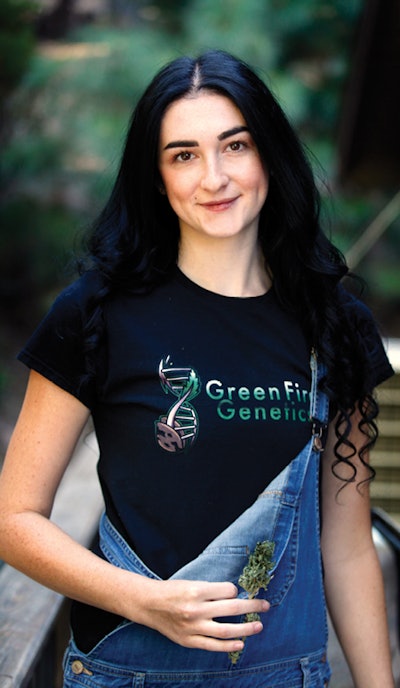
Many cannabis cultivators with decades, or even one decade, of experience might raise an eyebrow at a 20-year-old breeder. After all, what could someone so young really know?
But 20-year-old Alaina Austin has shattered perceptions of youth, making a name for herself, gaining the respect of other well-respected cultivators, and single-handedly running a medical cannabis business – Green Fire Genetics – in the heart of Lake County, Calif.
A third-generation cannabis farmer, Austin began cultivating her skills at a young(er) age. When she was 14, she took care of a 12-light grow. “That’s when I was working with my father under his wing,” she says. Today, four years into her role as founder and sole-proprietor of Green Fire Genetics, she says she uses a lot of her father’s methods, but puts “a new-school twist on it.”
In fact, that’s part of her mission: to mix the old with the new. “I feel extremely lucky to have some of the old-school landrace stuff that my father has given me, the amazing genetics my friends have blessed me with … to bring out everything I’m about to bring out,” she says, referring to a launch for new genetics she has been prepping for four years.
That leads to the other part of her mission: “to bring genetics that people have never seen to the masses,” she says. “I have a lot of CBD things I’m bringing out, with flavor. A lot of people think it’s just CBD you need for cancer. But honestly, you need a CBD-to-THC ratio, so I’m doing a lot of that for my genetic launch, and sharing what I’ve been holding onto for the last four years.”
In the meantime, she has built stable relationships with several of the most well-known medical cannabis dispensaries and worked by herself on her 360-acre plot of land. Her actual grow space is “five parcels – each one is on at least an acre,” she says, plus a sizeable hoop house and an indoor grow that spans about 2,500 square feet (the size of a large, three-car garage – the former use of the space).
While working alone “in the middle of nowhere,” as she describes it, could be daunting to many, Austin seems to be cut out for it. “It takes a certain type of person, and it breaks you down if you’re not accustomed to that lifestyle. It takes a strong-willed mind and a strong-willed person. You have to be able to be alone. You have to be able to be your own boss, to get up in the morning and tell yourself what to do, because nobody else is going to do it.”
What drives her is a love for the plant and a passion for helping people. “Cannabis has taught me patience; it’s taught me so much. I have so much gratitude toward the plant for that,” she says. “It’s helped not just me, but my family. I’ve lost a lot of family members to cancer, and it’s been heart-wrenching. It’s medicine. It really is. I’ve seen it firsthand.”
Here, in a candid interview, special Guest Interviewer Bruce Ayers, owner of Southern Humboldt Concentrates, talks with Austin about being a woman in a male-dominated industry, her work on genetics and how she sets herself apart in the highly competitive California marketplace, what she’s learned working in the cannabis industry and more.
Bruce Ayers: Do you find the cannabis business to be very friendly, or cutthroat?
Alaina Austin: I think a lot of people portray it to be very friendly, but it's actually extremely cutthroat. It's an everyone's-out-for-themselves kind of industry, I feel.
Ayers: Have you managed to make any alliances, even though it can be hard to, because you must be very protective of what you're doing and what you have going on?
Austin: Yes. I like to think that people recognize each other's vibes, and … that all the people I've met, we're all on the same level. … We're all extremely close. I've met some amazing, genuine people in the industry — some of my best friends.
Ayers: What strains, other than your famous Green Fire Genetics, currently captivate you or have your attention right now?
Austin: Definitely probably the Zkittlez, the Sherbet, anything with that exotic flavor profile, I'm really big on. The terpenes are exotic. I'm all about it.
Ayers: So obviously exotic would describe a rare flavor profile. Are there specific types of flavors that are super hot right now in cannabis?
Austin: I think the OG is always hot – the OG and the Cookies will always be staples in our industry. They've made their way up there.
Ayers: What Green Fire Genetics strain should we all be, as cannabis consumers, keeping an eye out for in the future?
Austin: Definitely the Green Fire OG, the Green Fire back-crossed into the Fire OG. That's going to be, if not the most similar to, probably better than the Green Fire itself. And if not that, the Grand Blueberry Pie – it tastes like candy. You walk into a room after you smoke a joint, and it doesn't even smell like cannabis. It smells like you lit up a Yankee Candle. It's crazy.
Ayers: That sounds amazing. There don't seem to be many female growers in the industry, and you're younger than most growers as well. Have you encountered any challenges due to your age, being a woman in a predominantly male industry?
Austin: Honestly, like I said, not being taken seriously until I open my mouth and start talking is the only thing I've ever really had an issue with. People give you respect. People like to give credit where credit is due, usually, in this industry. People will take you seriously if you take yourself seriously, and people will value you if you value yourself. But I feel it's definitely harder as a woman.
Ayers: On the exterior, it still seems to be an impenetrable industry for women, but if you really fight to assert your will, your goals can be achieved?
Austin: Definitely. I think you'll see a lot more women starting to come up in the next five, 10 years.
Ayers: Nice. Well, hopefully that happens. It's good to see young women like yourself getting involved.
Austin: Thank you, I appreciate that.
Ayers: You sell to Harborside Health Center; is that correct?
Austin: I do. They're one of my favorite dispensaries to deal with. They're extremely professional, and they give back so much in services as well as medicine.
Ayers: Did you approach them about buying your product?
Austin: Yes. I went to them; we established a relationship back in 2013.
Ayers: What's the experience like being able to say that your product is on the shelf at Harborside [said to be the largest medical marijuana dispensary in the world], and the experience of doing business with Harborside?
Austin: I'm going to say that one word that comes to mind is 'professional.' They make me feel extremely happy to work with them. I'm happy to be on their shelves. ... They treat us with a lot of respect, not like a lot of these places.
Ayers: So can it be hard, then, if things go on consignment with other clubs, receiving payment for work?
Austin: If you don't work with reputable clubs, I can imagine so, yes.
Ayers: How many other dispensary clients do you have?
Austin: I work with two others. One is Berkeley Patients Group, and one is Compassionate Heart in Ukiah, Calif.
Ayers: California is said to be a particularly challenging market for cannabis cultivators. Are you able to make a profit and a sustainable living?
Austin: Yes. That's where it comes along with the setting myself apart with different genetics as well. A lot of people, I feel, are growing the same stuff. … There's a lot of amazing growers in California. So you've got to take yourself that extra mile.
Ayers: So essentially, Green Fire's mission of bringing exotic genetics to the marketplace is how you will rise above and stay current in the cannabis industry?
Austin: Hopefully.
Ayers: Selling cannabis for medical uses and in California's competitive market, what is your philosophy on product quality?
Austin: Quality is everything. … I've seen a lot of quality go down, with concentrates being the main thing that everyone is wanting to consume. The flower production and quality has decreased immensely, unfortunately. But I also see a lot of good quality. But the production is definitely the most important, I feel, because the quality – the medicine that people need is [dependent on quality].
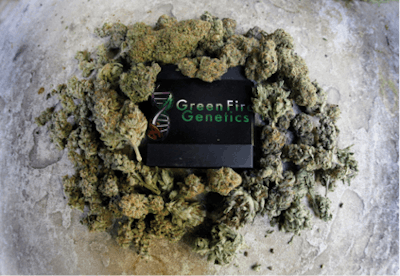
Ayers: Do you produce any concentrates?
Austin: I used to, but at the moment, no.
Ayers: What has been your biggest challenge running a cannabis cultivation operation in California?
Austin: Probably not just demand, but being able to do it all by myself. That's probably my biggest thing that I've run into. Other than that, I haven't had any issues in California with laws or anything like that.
Ayers: What would you say is your underlying reason for going it alone?
Austin: I've had partners before. I don't like to work with people, because a lot of people have different mindsets, and a lot of people don't see eye-to-eye, and I like to do what I like to do. And being alone lets me do that.
Ayers: So working alone, you're able to inflict your will upon your plants.
Austin: Yes. You can't blame anybody else, either. You take full responsibility.
Ayers: So you're a big believer in self- reliance?
Austin: Definitely.
Ayers: Do you intend to serve the recreational market if Proposition 64 is passed by voters in November?
Austin: Yes.
Ayers: Why?
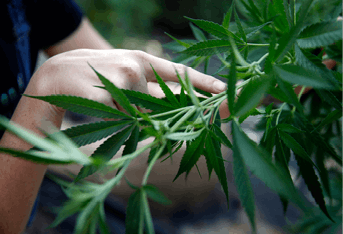
Austin: Because recreational is just as big as the market is for medical, and I feel that everyone has a right to medicine – if they have a card or not.
Ayers: What do you think of all these forthcoming regulations? Do you have any intention of making your farm legal?
Austin: I do. I definitely want to go the right route with permitting and all that. I ... see pros and cons of a lot of the things in some of these propositions, in some of the … things that they have on the ballot [initiative]. There are a lot of good things, but there are a lot of underlying things also in there that I'm not agreeing with.
Ayers: So overall, would you say you find yourself straddling the fence?
Austin: Yes. … I think a lot of farmers are right now.
Ayers: Do you think that your overall mission of wanting to make a high-quality … medical product will encourage you to make the transition and go for MMRSA [Medical Marijuana Regulation and Safety Act] permits?
Austin: Most definitely.
Ayers: A Proposition 64 permit?
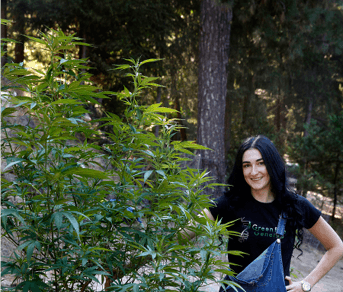
Austin: If that's where laws end up going, definitely.
Ayers: At the moment, how many different cultivars do you grow?
Austin: I have about 80 different cultivars and many phenos of each one.
Ayers: What are the top five most sacred cuts you hold?
Austin: The original OG Kush, the Green Fire, ... the ever-so-elusive Zkittlez now, the Grand Blueberry Pie, and probably the Bubba. Those are some of my all-time favorites.
Ayers: Is there any particular strain that has resonated particularly well in the market, or which you are most proud of?
“… Not being taken seriously until I open my mouth and start talking is the only thing I've ever really had an issue with. People give you respect. People like to give credit where credit is due.”
Austin: Probably the Green Fire.
Ayers: What have been some lessons you've learned the hard way?
Austin: I've learned to not trust everybody, and you can't give people the benefit of the doubt in this industry. Not to really work with people unless they have good intentions. I've had a lot of bad partners that have definitely made me not want to work with anybody.
Ayers: What is the single largest issue you face and/or that you see facing the legal cannabis producer in California?
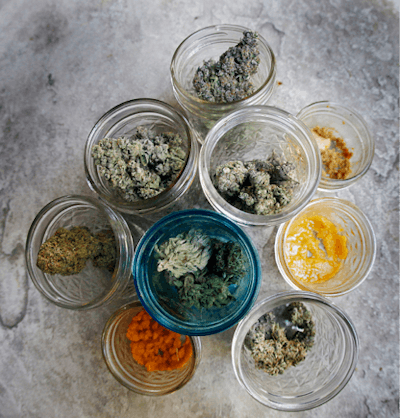
Austin: Being able to keep up with demand, and having quality meet that level.
Ayers: With all the different challenges that face California cannabis farmers, and you particularly living in an area that's had probably, what, 60, 70 percent of it burn up in a wildland fire, do you find things like that, or drought, bothersome?
Austin: Definitely. I've watered my plants 10 times less than what I would normally do. I would like to be giving them at least 100 gallons on each pot. … So I’m definitely trying to keep it really, really, really, low this year.
Ayers: If you could trust people, and there was a good workforce in the middle of nowhere, which is kind of an oxymoron, how many employees would you see yourself needing for the operation?
Austin: I would honestly love to have at least three to five all the time.














